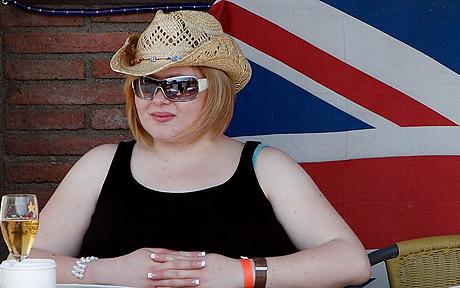In the wider context of tourism, the British have never been particularly flatteringly perceived. Repeatedly, surveys will be commissioned aiming to humble them into more considerate behaviour.
 The British tourist has traditionally been considered rude, mean, poorly behaved and linguistically incompetent. Whereas the stereotype of the holiday in the UK is all red buses, telephone boxes and the London Eye, the stereotype of the UK holidaymaker abroad is a sun-reddened shirtless and overweight man translating from English to the local tongue by shouting instructions and flailing gesturing arms energetically.
The British tourist has traditionally been considered rude, mean, poorly behaved and linguistically incompetent. Whereas the stereotype of the holiday in the UK is all red buses, telephone boxes and the London Eye, the stereotype of the UK holidaymaker abroad is a sun-reddened shirtless and overweight man translating from English to the local tongue by shouting instructions and flailing gesturing arms energetically.
Little wonder then that the stereotype of the British expatriate isn’t all that favourable either. Having lived for much of their lives in the perpetual murkiness of British weather, the stereotypical British expatriate has been attempting to harness the power of the Spanish sun to power an existence as British as roast beef and just as bland. They socialise with other expatriates in bars named after famous London landmarks, shop in British supermarkets and speak Spanish less fluently than Christina Aguilera.
But is this stereotype at all justified, and is integration possible for British expatriates?
Certainly, there are those who are content with their British ghettos, little outposts of the United Kingdom on sun-soaked hills. But so long as they’re contributing to the wider economy of their adopted countries, is this really a problem?
It’s more of a case of non-expats looking at the phenomenon and remarking how they wouldn’t be party to it. Ultimately, the expatriate who fails to integrate won’t have any sway on local politics either, so it’s a somewhat harmless practice. Furthermore, this ‘attitude’ is most common among those for whom proper integration would be more difficult. A retiree Grandmother living in a foreign country might be encouraged to learn the local tongue, but should she really be forced?
Integration may be being resisted by a few expatriates, but in certain countries the local government and its systems are in some way at fault. In the glittering cities of the United Arab Emirates, (which have been steadily growing as a top expatriate destination for many countries) language teaching is being blamed for poor integration.
The private school system teaches children Arabic for 8 to 10 years as a compulsory part of the curriculum, but many do not attain even basic fluency. This is partly a matter of practice: the circles in which expatriate children move do not frequently use Arabic in spoken language. But a lack of standardisation and regulation seems to be harming chances of integration in a land with an already widely criticised social stratification.
The attitudes of the much maligned British person abroad aren’t the only thing standing in the way of proper integration. Open hostility from the local community is always potentially a parallel issue. It is unusual, perhaps, to find a place that’s exceptionally enthusiastic about any form of integration.
A recent British Council MIPEX (Migrant Integration Policy Index) study ranked Sweden highest of all nations in North America and Europe. Portugal, Canada, Finland and Holland followed closely, with particular attention paid to access to education and the effectiveness of anti-discrimination policy.
The landscape of expatriate integration has certainly changed. In Spain particularly, the global recession has forced many expatriates out of work and even out of the country.
The Spanish government is currently pondering whether to bulldoze about 100,000 homes built illegally in the South. Many of these homes already have expatriate owners, who’ve been fighting tooth and nail to not lose the property they purchased in good faith. The bubble has burst. But in the recovery to come, perhaps the mistakes on both sides will be learnt and a better integrated British community abroad will flourish.